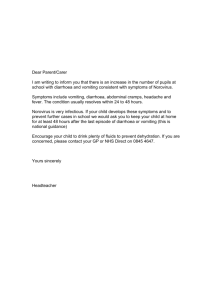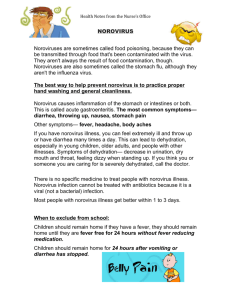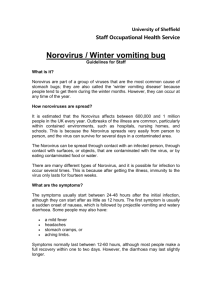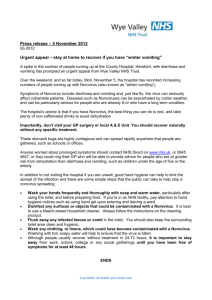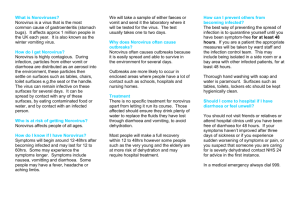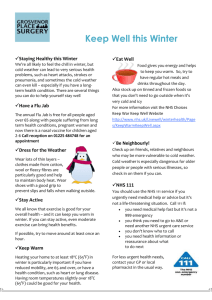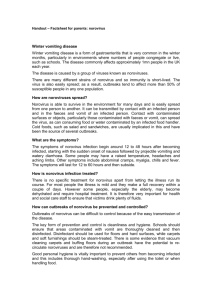Document 10816449
advertisement
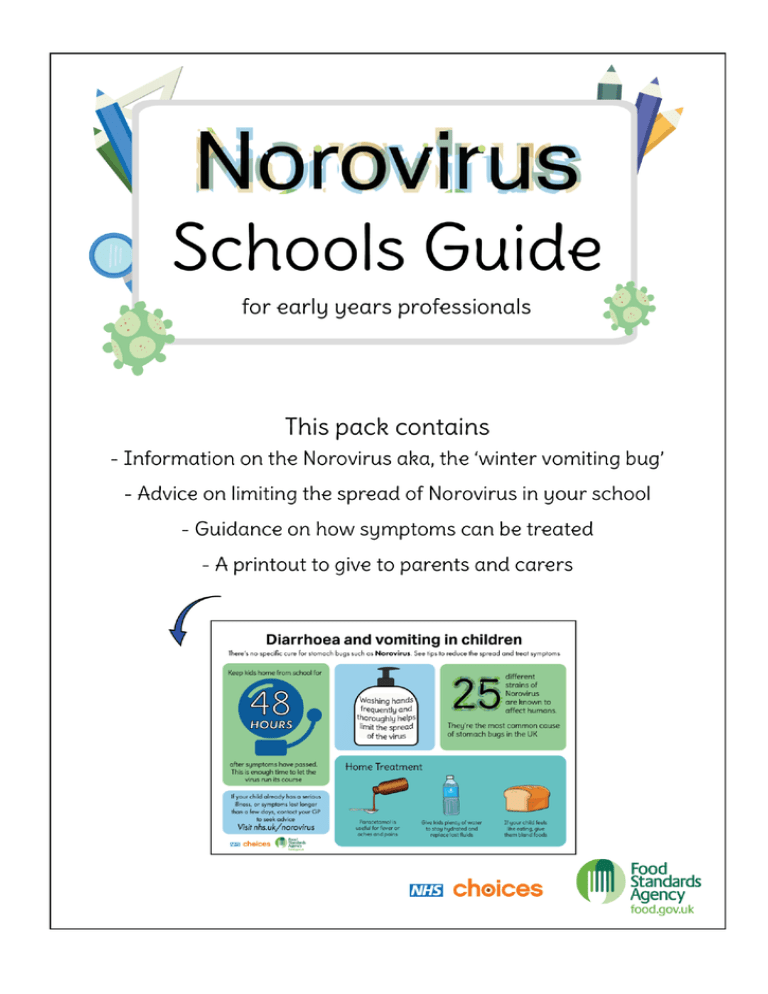
Norovirus schools guide Norovirus, also known as the winter vomiting bug, is the most common stomach bug in the UK. NHS Choices, in collaboration with the Food Standards Agency, has put together this useful guide and printout to help schools and parents understand Norovirus, from detection to prevention. What is Norovirus? Norovirus is highly contagious. It’s particularly prevalent in schools and nurseries as the virus can survive for several days on surfaces or objects. But it can affect people of all ages and cause vomiting and diarrhoea. There is no cure for Norovirus, so it has to be left to run its course. The symptoms are unpleasant and can initially be quite distressing, but they shouldn't last for more than a couple of days. Adults and children with Norovirus symptoms should avoid visiting GP surgeries or hospitals to prevent the further spread of the virus. Because the virus is highly contagious, children who have Norovirus symptoms must remain off school or nursery for 48 hours after the last episode of vomiting or diarrhoea to stop the spread of the infection to other children and staff. Different types of Norovirus Norovirus is the most common cause of stomach bugs in the UK, with at least 25 different strains known to affect humans. Each year, it's estimated between 600,000 and 1 million people in the UK catch Norovirus – because there are so many strains, we don’t develop immunity to it. The virus is sometimes called the "winter vomiting bug" as it's more common in winter. However, you can catch the virus at any time of the year. How do you treat Norovirus? To treat the symptoms of Norovirus, we recommend the following for children and young people: Ensure they drink plenty of water to avoid dehydration. Give them liquid paracetamol for any fever or aches and pains. If they feel like eating, give them easy to digest foods such as bananas or brown rice. Stay at home – there is nothing the GP can prescribe for sickness and diarrhoea, although your local chemist may be able to provide rehydration solutions. Contact your GP or NHS 111 to seek advice if the symptoms last longer than a few days, or visit nhs.uk/norovirus for more information. Preventing the spread of Norovirus Norovirus is easily spread – you can catch it simply by touching contaminated surfaces or objects. Early years staff, teachers, school staff, and parents can help prevent the spread of Norovirus by: washing hands frequently with household soap, and encouraging children to do the same – especially after going to the toilet ensuring any infected child is not sharing things such as toys, blankets, and so on keeping any child with Norovirus symptoms home from school and away from other children where possible – children with Norovirus should also avoid contact with vulnerable adults, such as elderly relatives It is also important that schools and nurseries thoroughly disinfect all surfaces an infected person may have come into contact with whenever possible. Alcohol-based hand gels are not effective against Norovirus. For further information, visit nhs.uk/norovirus or contact NHS 111. You may wish to talk to your school nurse about infection control and materials that can be used in schools to increase pupil and parent awareness. Project background NHS Choices and the Food Standards Agency have this year conducted a significant research project looking at how we can best tackle some of the issues of misinformation surrounding winter vomiting bugs. The information in this pack has been produced to empower teachers and school nurses to help stop the spread of Norovirus, and enable parents and guardians to react to the virus effectively and without putting others at risk. By distributing the information within this pack, you are helping to reduce the spread of a highly contagious virus that puts many NHS services under great pressure and can seriously affect the health of some vulnerable groups. This material forms part of a wider digital campaign to help the public understand Norovirus, to be launched later this winter. Notes for teachers and school nurses The black and white version of the poster has been produced to keep the costs of printing at a minimum should you choose, while we recommend schools add the colour version to their website and signpost parents and guardians to the documents. Our user research suggests parents are a key group to target with Norovirus information as they are among the most likely to take their child to a GP or hospital with symptoms of the virus – a major cause of infectious spread. General understanding of the term “Norovirus” is low, and it may be more helpful to refer to the symptoms (diarrhoea and vomiting) in communications with parents.
